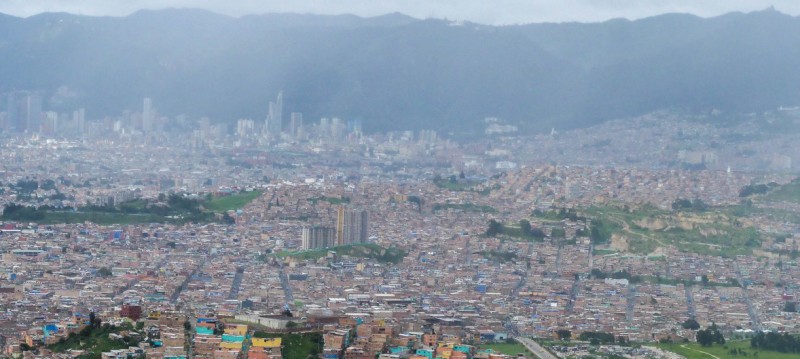Panoramic view of the city of Bogota, the capital of Colombia and one of the four participants of the Climate Smart Cities Challenge Mayors of Mexico City, Bogotá, New Orleans, Freetown, Gaziantep and Barcelona joined other urban leaders, designers, activists and thinkers from around the world on Wednesday, to chart a new path for cities. A launch event called Cities at the Crossroads, kicked off at the British Academy in London – marking the inaugural session of the new UN-backed Council on Urban Initiatives. The international group of eighteen mayors, activists and academics was formed in response to UN Secretary-General’s call to use the COVID-19 pandemic as an “opportunity to reflect and reset how we live, interact, and rebuild our cities.” In a video message showed at the event, António Guterres remembered that cities large and small, “have been epicentres of COVID-19 and are on the frontline of the climate crisis.”
"Cities are at the heart of the climate change problem. But cities are also the key to the solution. Cities need to take climate change seriously and reduce their carbon emissions" @MaimunahSharif #ClimateSmartCitiesChallenge @UNHABITAT pic.twitter.com/6hSX80fWa7
— UNHabitatLive (@UNHABITAT_Live) November 3, 2021
They also face severe risks from climate change, which will only grow, according to UN estimates.
By mid-century, over 1.6 billion urban residents may have to survive through average summertime highs of 35 degrees Celsius. More than 800 million could be at direct risk from sea level rise.
‘A bold new narrative’
For the UN Secretary-General, the pandemic “must be an inflection point to rethink and reset how” people live, interact and build cities.
“Investment in pandemic recovery is a generational opportunity to put climate action, social justice, gender equality and sustainable development at the heart of cities’ strategies and policies”, Mr. Guterres said.
The UN Chief also noted that more and more cities across the world are committing to net zero by 2050, or before.
“The sooner we translate these commitments into concrete action to reduce emissions, the sooner we will achieve green job growth, better health, and greater equality”, he argued.
Also addressing the event, the UN-Habitat Executive Director asked for “a bold new narrative now.”
“We need to bring visionary mayors to the table to help address these interlinked global crises and reframe the discourse on the role of cities, urban governance, design and planning”, Maimunah Mohd Sharif said.
Change conversation
The Council’s mission is to ensure a healthy global debate over urban issues, to help chart a sustainable future. The work will be organized around three challenges: the JUST city, the HEALTHY city and the GREEN city, said UN-Habitat.
The new Council starts its work as the UN’s COP26 climate conference continues in Glasgow, Scotland, trying to keep the goal of 1.5 degrees of global warming, within reach.
Being responsible for approximately 75 per cent of the world’s energy consumption and over 70 per cent of global greenhouse gas emissions, cities are at the core of climate action.
A global challenge
Also this Wednesday, at the World Expo in Dubai, the UN launched the Climate Smart Cities Challenge.
The initiative is an open innovation competition to identify climate smart solutions and reduce urban impact, between the cities of Bogotá, Colombia; Bristol, United Kingdom; Curitiba, Brazil; and Makindye Ssabagabo, Uganda.
According to UN-Habitat, “the climate ambitions of these cities are impressive and addressing them will have a powerful impact in shaping how city leaders, innovators and local communities respond to the climate emergency.”
Competition
With these four cities selected, the competition is now asking innovators, including technologists, start-ups, developers, finance experts and more, to submit their best solutions to the unique challenges identified. The application period closes on 5 January.
Up to 80 finalists (up to 20 per city) will be selected to work closely with these four cities, learn more about their challenges, collaborate on solutions, and ultimately form teams to demonstrate solutions in the real-world.
The winning teams will share up to 400,000 Euros to leverage further investment and build towards system demonstration in 2023.
Around 4.5 billion people live in cities today, but that number is projected to grow by almost 50 per cent, by 2050. By mid-century, over 1.6 billion urban residents may have to survive through average summertime highs of 35 degrees Celsius.




Comments are closed.